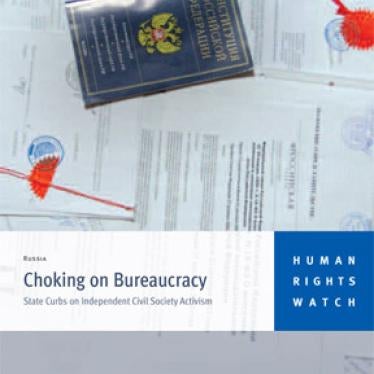Russia's laws and practices regulating nongovernmental organizations are stifling independent civic activism and need extensive reform, Human Rights Watch said in a report released today.
The 68-page report, "An Uncivil Approach to Civil Society: Continuing State Curbs on Independent Civil Society Activism," describes how current rules allow the state to interfere arbitrarily with the work of nongovernmental organizations (NGOs), and documents the corrosive impact of these rules and other government measures on independent organizations and activists in Russia. The report states that increased pressure on these groups has been only one part of growing authoritarianism in Russia.
President Dmitri Medvedev convened a working group in May 2009 to begin reform of a limited portion of the laws that regulate some nongovernmental organizations.
"President Medvedev has taken the first step to break from the increasingly authoritarian approach to civil society over the past nine years," said Holly Cartner, Europe and Central Asia director at Human Rights Watch. "Now he needs to make sure that the reform brings about real change, and push forward with other urgently needed measures to stop the bullying and pressure on nongovernmental organizations."
The Human Rights Watch report illustrates how current regulations profoundly undermine independent civil society organizations and activism by burdening the groups with red tape and forcing them to fend off specious lawsuits. The report also describes how the deeply negative climate in which the groups operate is exacerbated by new restrictions on grants and subsidized office space, and a growing number of physical attacks and hostile statements directed at NGOs and activists.
"The regulations contribute to the hostile environment for organizations and activists, but so do physical attacks and growing financial pressures," said Cartner. "The authorities need to ensure that nongovernmental organizations and activists are protected from harassment and attacks, and are safe to carry out their vital work."
The report details how the Ministry of Justice is using a 2006 law on NGOs and other regulations to reject registration applications or notifications of organizational and operational changes on non-substantive, minor grounds, such as typographical or formatting errors.
The Ministry of Justice can conduct intrusive inspections of nongovernmental organizations every three years, and also unlimited "unplanned" inspections based on potentially unverified complaints and information. Organizations are also required to submit annual reports to the ministry, especially relating to any foreign sources of funding. The director of one organization reported spending 10 percent of her time in one year complying with the inspection and reporting requirements.
The law authorizes the Ministry of Justice to take disproportionate, punitive measures in response to minor administrative violations. In some cases, the ministry has been quick to resort to such measures, such as rejecting registration documents, issuing warnings, or seeking dissolution. In three cases documented in the report - in Vladimir, Tyumen, and Ulan-Ude - the ministry dissolved groups based on alleged minor administrative violations.
Organizations that work on particularly controversial topics or that receive foreign funding have been the targets not only of Ministry of Justice inspections and warnings, but also harassing tax inspections, inspections for building code or labor code compliance, inspections for pirated software, and police raids. Groups that work on human rights, or that express or mobilize dissent, are also vulnerable to arbitrary application of the Law on Countering Extremist Activity and associated anti-extremism criminal statutes.
At a meeting with the members of the Presidential Council for Civil Society Institutions and Human Rights on April 15, Medvedev acknowledged the difficulties faced by nongovernmental organizations, including restrictions "without sufficient justification," and the fact that many government officials view such groups as a threat. At the time, Medvedev stated his willingness to review the law, which led to the creation of the working group.
The working group set up by Medvedev proposed a simplified registration process for NGOs registered as noncommercial organizations, about a third of the total. The procedure for the remaining two-thirds would remain unchanged. Other provisions identified as troublesome in Human Rights Watch's report, such as inspections and regulation, are not addressed in the working group's proposal.
Human Rights Watch jointly with several Russian human rights organizations submitted to Medvedev's working group and the Ministry of Justice proposals for reform of laws regulating nongovernmental organizations. The proposals are based on standards on the creation, management, and general activities of these groups developed by the Council of Europe. The proposals are included as an appendix to the report.
"The current reform process is an important first step, but the Russian government needs to do much more to ease the profoundly hostile climate for civil society groups, created by stifling regulations, negative attitudes, and harassment," said Cartner. "Russia needs to protect the rights to freedom of association and expression, and ensure that reform does not stop until the job is done."






